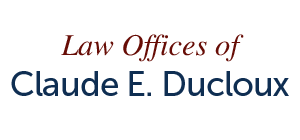Services
Administrative Law
Administrative law is the representation of clients before State Agencies and Commissions which may either regulate or license the client's profession or business. Texas has empowered numerous agencies and licensing authorities to wield great power over business and professional practice. Austin attorneys have a unique opportunity to represent clients in front of these agencies, which are generally headquartered in Austin.
Elsewhere on this website, there are "Links" to various state agencies, where clients and attorneys can download information, rules, and explanations of the nature of the agency and its powers.
Claude's administrative practice regulary includes representing various licensed professionals before their state boards. This has included, doctors, nurses, accountants, other lawyers, surveyors, and law students seeking licensure (before the State Board of Law Examiners).
In the event a particular client loses his/her case, Claude has represented the client in the administrative appellate process, generally involving a petition to the District Court of Travis County.
Please feel free to make inquiry or appointments concerning any questions you have about administrative practice.
Mediation / Arbitration
Mediation is an alternate dispute resolution technique whereby a neutral party meets with the disputing parties and negotiates a resolution. The venue for the mediation is generally the mediator's office, but large mediations may require alternate arrangements. The goal of the mediation is a written settlement agreement signed by the parties.
Claude Ducloux has conducted more than 1,500 mediations since 1990, with great success. The cost of the Mediation is generally divided between the parties, and is generally based upon a division of the Mediator's prevailing rate, although some mediators charge a flat daily rate, which generally is more expensive than a hourly rate.
Claude charges an hourly rate, divided either between or among the parties, which gives the parties additional encouragement to resolve the matter, if it can be resolved, in the shortest amount of time possible.
Please feel free to call the office for more information.
Arbitration, by comparison, is the process whereby the hired, neutral arbitrator, in essence is empowered by a contract between the parties to act as a private judge. The arbitrator hears the evidence the same as a judge, and usually drafts a decision (generally called an "arbitation award") after considering all the evidence.
Claude conducts arbitration on an hourly basis, too, but, like most arbitrators, generally will require a retainer of appropriate size from each party, depending on how long the arbitration is expected to last. One-day arbitrations may be paid the same day.
The benefit of arbitration has been touted as speed and ease of resolution. The criticism of arbitration is that it frequently is more expensive than simply going to court, and there is very limited recourse from a arbitrator's error in deciding the matter, whereas the appellate process is fully available for review of a judicial decision.
Claude advises his clients to be wary of mandatory arbitration clauses in any business contract, as the benefits may well be outweighed by the dangers, including cost and uncertainty of outcome.
Civil Law
The practice of civil law, generally speaking, involves analysis of contracts, statutes (laws), and legal relationships between parties, especially focusing on duties which the law imposes on parties voluntarily (through legally binding contracts) and as a result of laws written by the legislatures and other governmental authorities.
With a broad general practice, Claude regularly counsels individuals and corporate representatives of their rights and duties under the law, and seeks to resolve questions quickly, ethically and courteously. His 30 years of experience very often results in less time spent researching matters, as his broad exposure to a myriad of legal situations during his career serves him and his clients well.
There are specialty areas, however, like complicated estate planning, tax work, and patent or trademark matters which generally require the attention of a professional uniquely equipped to provide specific advice. Claude will always refer such specific matters either to an associate or another known professional in the community.
Family Law
Philosophy - Claude brings his overall legal philosophy to the practice of family law (divorce work). That philosophy is: "How can I be a problem solver, and resolve this matter quickly and inexpensively, preserving courtesy, dignity, and do justice for the parties?" For many clients, divorces are frequently the most emotionally traumatic events of their lives. Unfortunately, the pain and anger can lead to bad judgment, including spending too much to resolve a relatively small case.
Fairness - Claude first and foremost counsels clients to be reasonable, fair, and objective in resolving a divorce matter. Due to the frequency of divorces in our society, the primary governing law in Texas, the TEXAS FAMILY CODE, is very specific on how many matters are to be resolved. Therefore, "winning" a divorce case may simply mean receiving 5% more than "losing" a divorce case.
Put Kids First, but Plan for the Future - Of primary importance when children are involved is preserving some boundaries for an ongoing relationship the parties must necessarily have to properly communicate and co-parent their children. Both common sense, and Texas law, require that the best interests of the children remain paramount.
Mediation Experience - Claude is regularly hired by other attorneys to mediate the final terms of divorce settlements. He has been very successful in bringing closure and finality to dozens of couples going through the process.
Clients should feel comfortable making an appointment to discuss any matter without long term obligation.
